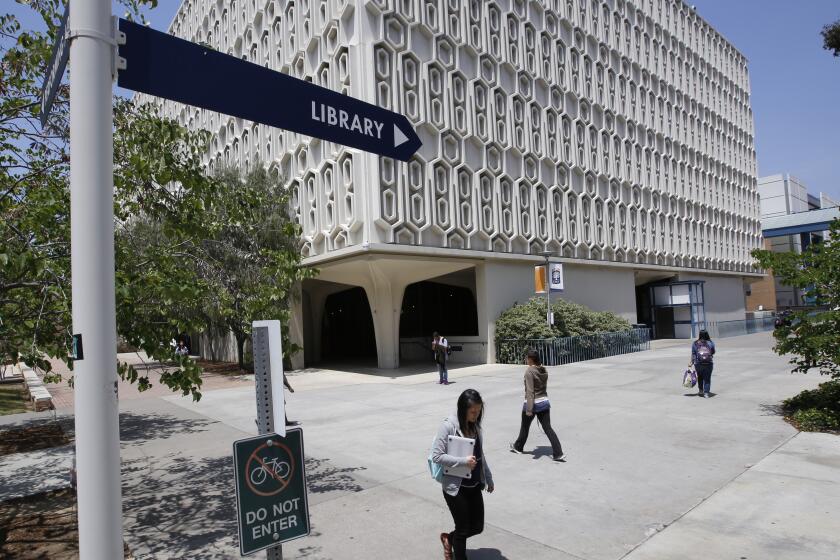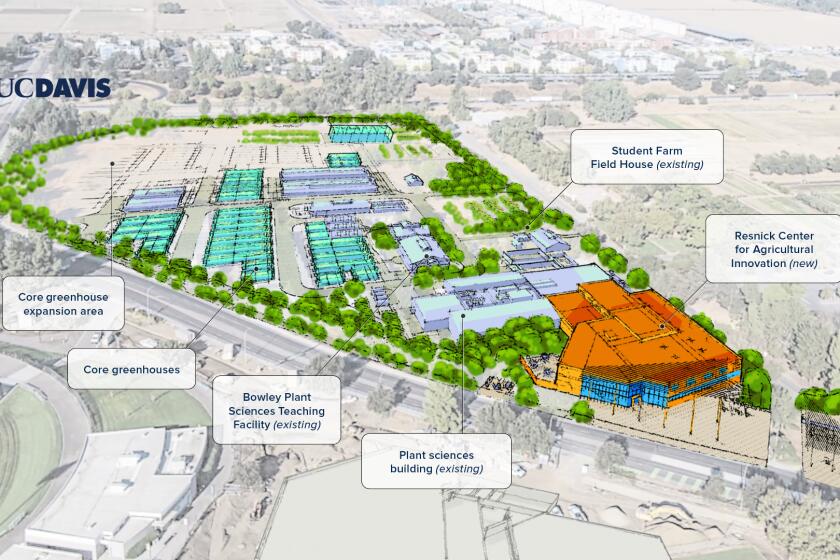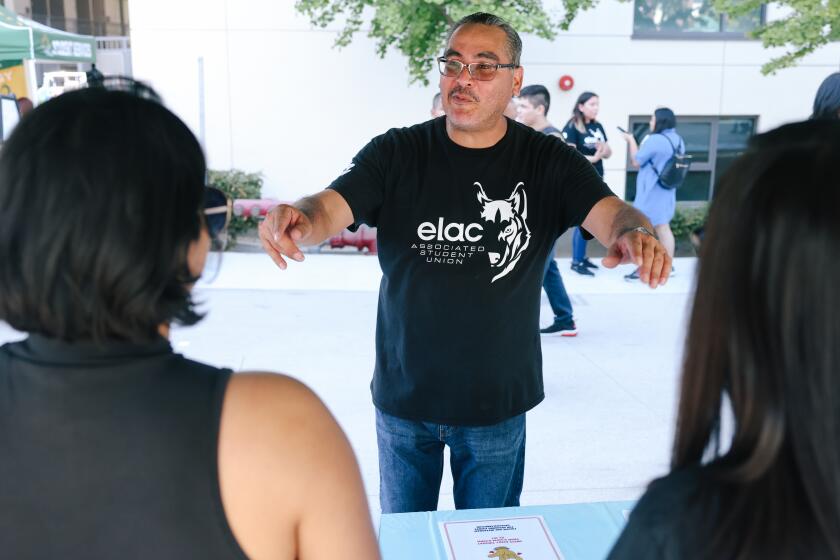Column: Where have all the English majors gone?

- Share via
It’s not exactly news that the humanities are in decline and college students are turning toward skills-based and career-focused fields of study.
In fact, 2021 was the ninth straight year, according to the American Academy of Arts and Sciences, that the number of students graduating with a major in the humanities has fallen. According to federal data, the number of English majors dropped by a third from 2011 to 2021, and students majoring in religion, area studies and history fell even more.
Academic fields such as anthropology, sociology and philosophy are also shrinking. But nursing, criminology and public administration keep growing. The number of computer science and engineering majors has exploded.
Opinion Columnist
Nicholas Goldberg
Nicholas Goldberg served 11 years as editor of the editorial page and is a former editor of the Op-Ed page and Sunday Opinion section.
Dozens of private colleges have gone out of business entirely over the last 10 years, partly because of reduced demand for a traditional liberal arts education. At others, departments have been cut back, merged or even closed.
We’re living in an increasingly STEM-dominated, tech-centric, employment-focused world.
I was reminded of that when I recently read an article that mentioned the rise of “supply chain management” courses at small liberal arts schools. I admit I found it disturbing.
I wasn’t even aware there was such a field of study. But it seems that it’s an increasingly popular offering designed to ensure that students leave school able to find work in the logistics sector. They learn about getting products from where they are produced to the consumers who need them through a complex of factories, warehouses, transport vehicles and such like.
Offering courses in supply chain management is part of academia’s trend toward promising undergraduates a “return on investment.”
California saw a 1.1% drop in undergraduates, a slower decline than last fall when enrollment dipped 5.9%.
And that makes a certain amount of sense. When private college costs as much as $60,000 a year, it’s no surprise that students (and their parents) think of it as an investment for which they should expect to get back something tangible and valuable. A 2021 study showed that two-thirds of college students believe higher education is not worth what they’re paying for it.
Students often come out of school burdened with debt and anxious about their financial futures, and they’ve all heard stories about Uber drivers who know Greek and Latin and baristas with PhDs in sociology. Of course they want to be employable.
But I can’t help it — the heightened focus on jobs worries me. You don’t have to be a snooty ivory tower philosophy professor or an entitled, dilettante German literature student to see that supply chain management is not an academic discipline, at least not in the sense that most of us who grew up in previous generations are used to.
If we all study engineering, nursing, computer science and supply chain management and allow the humanities and social sciences to fade away, something terribly important will be lost, for students and society both.
Particularly at a time of demagogic populism and close-minded partisanship, when civic discourse is being coarsened and dumbed-down.
Lynda and Stewart Resnick give UC Davis $50 million, the largest donation the university has received, to build a center focused on agricultural innovation.
The liberal arts matter because how we think matters as much as our acquisition of job skills.
In 2015, Wisconsin’s Republican Gov. Scott Walker stumbled gracelessly into this debate when he tried to alter the mission statement of the University of Wisconsin by deleting the words that called on the university to “search for truth” and “improve the human condition.” In their place he wanted to substitute words calling on the university to “meet the state’s workforce needs.”
The backlash was loud and Walker was unsuccessful. But he’d made his point.
The way I see it, we need to build a productive, prepared American workforce and hone its skills for the 21st century. But we also need to remember that the humanities and social sciences — history, literature, philosophy, sociology, political science and the rest — are crucial to an educated, thoughtful citizenry.
A liberal arts education expands imaginations, fires up curiosity and encourages open-mindedness. Through writing and argument and cultural studies, it encourages critical thinking. It emphasizes nuance and complexity. It rewards intellectual honesty.
(I should perhaps note that it does all those things when it is working properly. Unfortunately, it seems that open-mindedness and robust debate are less prized on campuses these days than they were in the past.)
California community college students say taking classes online allows them to juggle work and family, and pursue their dreams of higher education.
At their best, the humanities and social sciences help students (and the adults they become) maneuver through the complications and contradictions of the world. Learning languages, studying other countries, remembering history — they broaden perspectives and help us transcend global differences.
It shouldn’t be an either-or choice. Engineers and nurses can be trained in their fields and also educated in the liberal arts, just as English majors can come out of school with skills to help them find jobs. Studies show that many employers are looking for exactly the sort of writing and reasoning abilities that humanities and social science majors have.
“It’s not like humanities majors are ending up as baristas,” said Robert Townsend, director of humanities, arts and culture programs at the American Academy of Arts and Sciences. “Their job satisfaction, their life satisfaction, are pretty much like everybody else who gets a college degree. And they do a whole lot better than those who don’t get a degree. So the idea that there’s no return on their investment is ridiculous.”
Don’t let your alma mater wipe out the philosophy department. If you want to major in public administration or supply chain management, choose a school that demands that you also read some history. At a time of rampant polarization and partisanship, we’ll all be better off if the liberal arts, the humanities and the social sciences remain with us for a long time.
More to Read
A cure for the common opinion
Get thought-provoking perspectives with our weekly newsletter.
You may occasionally receive promotional content from the Los Angeles Times.















